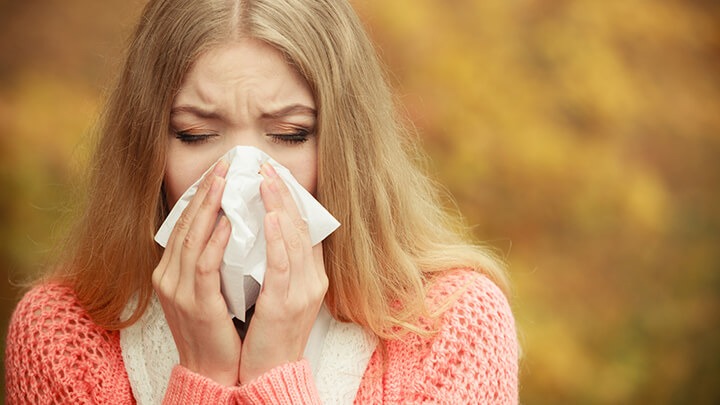The weather is turning slightly brisker and fairly soon the trees will be decorated with multicolored leaves. Like many people, I enjoy fall festivities, which for me and my family include apple and peach picking expeditions and visits to pumpkin patches. (I’m not a huge fan of picking up all those fallen autumn leaves though…)
As autumn arrives, I’ll be engaging in another seasonal activity too. Every year around this time, a steady parade of patients arrive in my office complaining about fall allergies. The symptoms have become so familiar — itchy eyes, stuffy noses, and slightly scratchy throats — that I don’t even have to look at my calendar to know that it’s fall. Most of my patients have no idea what they are actually reacting to… they just want relief.
What causes allergies?
The most common allergen in the fall is pollen from ragweed, which are ubiquitous across the United States. According to climatologists, the duration of the “hay fever” season has been increasing and pollen concentrations have been rising as a result of climate change. That means a lot more misery for the roughly 20 percent of the population that is afflicted with seasonal allergies.
Ragweed pollen is not going away for another reason — a single plant from this genus (the Ambrosia family) can release over 1 billion allergenic granules. These particles can trigger an intense immune response in susceptible individuals, causing inflammation in nasal passages, the throat, and eyes…and can trigger asthma in the most unlucky ones. That’s because the body’s natural defense system interprets these relatively benign pollen grains as dangerous foreign invaders.
As you might expect, there have been efforts to control and eradicate ragweed type plants through mowing, the use of chemical herbicides, and uprooting. But virtually all these strategies have failed because ragweed plants tend to be very hardy, can become herbicide resistant, and their pollen particles can travel hundreds of miles. The question, then, becomes what can people do minimize exposure and alleviate irritating symptoms?
Creating a pollen-free zone
One of the first things I recommend is turning at least one room in your house — typically your bedroom — into a sanctuary. This is the one place in your home where you can keep pollen exposure to a minimum. You can accomplish this by:
- Changing your linen frequently and using the hottest wash cycle possible to eliminate dust mites.
- Using allergen-proof zippered covers on pillows and mattresses.
- Keeping surfaces clean and dust-free.
- Replacing dust-trapping carpets with hardwood floors.
- Keeping windows closed when your allergies are acting up.
- Utilizing appropriate air conditioning, filtration, or purification systems, which can trap and eliminate common allergens like pet hair, dander, and dust particles. Be sure to change the filters on these devices regularly. For air filtration, HEPA (High Efficiency Particulate Arrestance) filters are ideal.
Bolstering your body to cope with allergens
Staying quarantined in a pollen-free zone is at best a temporary solution for most people. For most of us, exposure to irritants like pollen and dust is inevitable. There are several things you can do to try and mitigate your allergy symptoms when they do arise:
- I’m a big proponent of neti pots and nasal irrigation, which can help flush out allergens and decrease mucus accumulation.
- Live a less inflammatory lifestyle by eating more whole plant-based natural foods and getting regular exercise. I’ve learned to never underestimate the power of dietary and lifestyle changes…I’ve seen countless examples of allergy symptoms improving by treating the person in whom those allergies occur.
- Stinging nettle tea and supplements are a safe and effective form of allergy relief.
- NAC (N-acetylcysteine) is an amino acid that is available in supplement form. It is highly effective in thinning mucus secretions and I find it very useful in treating allergic disorders. Typical doses are in the range of 600-900 mg twice daily away from food.
- AI-4X is a uniquely-formulated combination of all-natural plant-based substances that have powerful anti-inflammatory properties. Ingredients include Boswellia and Curcumin, which help modulate inflammation-related disorders like allergies.
Takeaway
Allergies are nothing to sneeze at. They can sap your energy and make your life miserable in the process. They are also a symptom that your immune system is out of balance and overworking as a result.
Conventional allergy remedies do nothing to address the underlying problem, which involves an immune system that overreacts to very common irritants. Minimizing or avoiding exposure is a part of the equation for sure, but optimizing the immune system is often an overlooked part of a comprehensive naturopathic treatment plan.
Breathe easy,
Dr. Joshua Levitt









